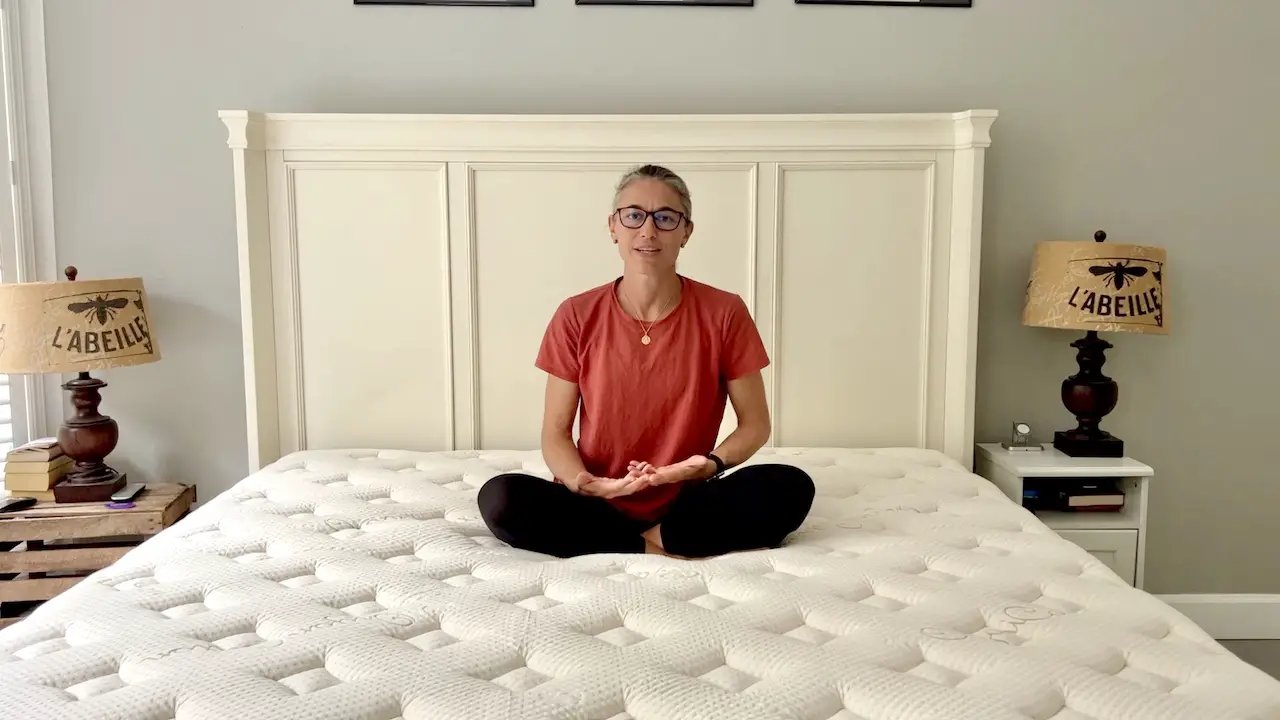CAN SNORING CAUSE HIGH BLOOD PRESSURE
Understanding the Link Between Snoring and Hypertension
Snoring is a common sleep issue that affects millions of people worldwide. While it may seem like a harmless annoyance, snoring can have serious implications for your health.
Among the potential health risks, one that stands out is its connection to high blood pressure. The National Institute of Health mentions that: “In all instances, snoring was significantly associated with uncontrolled hypertension, from a 20% increased likelihood of uncontrolled hypertension in those aged >50 years and obese to a 98% increase in those aged ≤ 50 years with body weight in the normal BMI range.”
Let’s explore how snoring causes high blood pressure, by examining the science behind this relationship, and providing valuable insights for anyone concerned about their sleep health.
This article is for informational purposes only and does not constitute medical advice. Always consult a healthcare professional for personalized guidance.
Table of Contents
What Is Snoring?
The Basics of Snoring
Snoring occurs when airflow is partially obstructed during sleep, causing the tissues in the throat to vibrate. This often results in a loud, raspy noise that can disturb your rest and that of others nearby.
Causes of Snoring
Nasal congestion: Blocked nasal passages force you to breathe through your mouth, increasing the likelihood of snoring. This typically happens when you experience a cold or flu-like symptoms.
Obesity: Excess weight can narrow the throat’s airway, making it harder for air to pass through freely, especially when laying on your back.
Sleep position: Sleeping on your back can cause the tongue to fall backward, obstructing airflow.
Alcohol and sedatives: These products relax throat muscles, making snoring more likely.
Anatomical factors: Enlarged tonsils, a deviated septum, or a long soft palate can contribute to snoring as well. Those factors may have a medical solution but may require the help of a doctor.
While occasional snoring is typically benign, chronic snoring can indicate underlying health issues, such as obstructive sleep apnea (OSA).
Understanding High Blood Pressure (Hypertension)
High blood pressure, or hypertension, is a condition where the force of blood against the artery walls is consistently too high. Over time, hypertension can lead to severe health problems, including heart disease, stroke, and kidney damage. Per the CDC, consistently over the years, over 48% of Americans deal with high blood pressure, which increases with age, with up to 70% of 60-year olds and above, dealing with hypertension.
Risk Factors for Hypertension:
Lifestyle factors: Poor diet, lack of exercise, and excessive salt intake. Those factors form the largest cause for high blood pressure in the general population.
Health conditions: Diabetes, obesity, and sleep disorders.
Genetics: A family history of hypertension.
Symptoms of high blood pressure are often subtle, earning it the nickname “the silent killer.” Regular monitoring and awareness are essential for early detection. Your pressure is checked every time you meet with your general practitioner – don’t miss your yearly physical.
Can Snoring Cause High Blood Pressure? The Scientific Connection.
Research shows a strong association between snoring and high blood pressure, particularly when snoring is a symptom of obstructive sleep apnea (OSA). Here’s how the connection works:
1. Obstructive Sleep Apnea and Blood Pressure Spikes
OSA is a condition characterized by repeated pauses in breathing during sleep. These pauses lead to sudden drops in blood oxygen levels, triggering the release of stress hormones. These hormones increase heart rate and constrict blood vessels, causing blood pressure to rise.
Key Statistics: Studies indicate that up to 50% of people with OSA also have hypertension.
2. Sleep Fragmentation and Stress Hormones
Frequent interruptions in sleep due to snoring or OSA disrupt the body’s natural rest and recovery processes. Sleep fragmentation can lead to:
Increased cortisol levels (a stress hormone).
Activation of the sympathetic nervous system (the body’s “fight or flight” response).
Both of these factors contribute to elevated blood pressure levels over time.
3. Inflammation and Vascular Health
Chronic snoring and sleep apnea can cause low-grade inflammation, which negatively affects blood vessels. This inflammation may reduce the vessels’ ability to relax, further contributing to hypertension.
Signs That Snoring May Be Affecting Your Blood Pressure
It is essential to recognize when snoring might be more than a simple inconvenience. Watch for the following signs:
Loud, persistent snoring.
Daytime fatigue despite adequate sleep.
Morning headaches or dry mouth.
Observed pauses in breathing during sleep.
High blood pressure readings during routine check-ups.
If these symptoms sound familiar, consulting a healthcare provider is crucial for early diagnosis and preventive treatment.
How to Address Snoring and Reduce High Blood Pressure Risks
Addressing snoring not only improves sleep quality but can also reduce the risk of developing high blood pressure. Here are some strategies:
1. Lifestyle Changes
Weight management: Losing excess weight can reduce throat tissue, alleviating snoring.
Limit alcohol and smoking: Both substances relax throat muscles, worsening snoring.
Exercise: Regular physical activity improves cardiovascular health and reduces hypertension risk.
2. Sleep Hygiene
Sleep position: Sleeping on your side can minimize snoring. Sleeping on your back is generally the worst position for snoring as your airways collapse, making it harder for air to pass through.
Elevate your head: Using an adjustable bed or extra pillows can improve airflow.
Maintain a consistent sleep schedule: Adequate rest supports overall health. Use this 7-to-10AM bed time routine for adults is you need to establish a consistent sleep routine for better rest.
3. Medical Interventions
CPAP therapy: Continuous positive airway pressure (CPAP) machines are the gold standard for treating OSA.
Oral appliances: Dental devices can help keep airways open during sleep.
Surgery: In severe cases, surgical options may be necessary to address structural issues.
4. Monitor Blood Pressure Regularly
If you are concerned about hypertension, invest in a home blood pressure monitor and track readings consistently. Share this information with your doctor for personalized advice.
Prevention Tips: Protecting Your Sleep and Cardiovascular Health
Preventing snoring and hypertension involves adopting a proactive approach to health. Consider these tips:
Maintain a healthy diet rich in fruits, vegetables, and whole grains.
Avoid caffeine and heavy meals close to bedtime.
Stay hydrated but reduce fluid intake late in the evening.
Create a comfortable sleep environment with supportive bedding and a quality mattress.
When to Seek Professional Help
If snoring is accompanied by signs of OSA or if you’ve been diagnosed with hypertension, it’s time to seek medical advice. Healthcare providers can:
Conduct sleep studies to diagnose OSA.
Recommend tailored treatments for snoring and high blood pressure.
Monitor your cardiovascular health closely.
The Link Between Snoring and High Blood Pressure
So, can snoring cause high blood pressure? The evidence suggests a strong connection, particularly when snoring is related to conditions like obstructive sleep apnea. Chronic snoring isn’t just a nighttime nuisance—it can be a sign of serious health risks that warrant attention.
By understanding the relationship between snoring and hypertension, you can take proactive steps to protect your health. Whether it’s improving your sleep habits, seeking medical treatment, or managing your blood pressure, prioritizing your well-being is essential.
References
- CDC. (2017). Hypertension Prevalence, Awareness, Treatment, and Control Among Adults Age 18 and Older. Retrieved from https://www.cdc.gov/nchs/products/databriefs/db511.htm
- News Medical Life Sciences. (2024). Is Snoring Related to High Blood Pressure. Retrieved from https://www.news-medical.net/news/20240219/Is-snoring-related-to-high-blood-pressure.aspx
- Harvard Health Publishing. (2013). Treating Several Snoring Can Heklp With Tough-to-Control Blood Pressure. Retrieved from https://www.health.harvard.edu/blog/treating-severe-snoring-can-help-with-tough-to-control-blood-pressure-201312116935
FAQ
Most frequent questions and answers
Yes, better sleep quality supports overall cardiovascular health, potentially lowering blood pressure by reducing stress and improving body recovery.
Yes, especially if snoring is accompanied by daytime fatigue, headaches, or pauses in breathing during sleep, as these may signal sleep apnea.
Lifestyle changes like weight loss, avoiding alcohol before bed, and using CPAP therapy for sleep apnea can help reduce the risk.
No, occasional snoring is common and often harmless, but persistent or loud snoring may indicate underlying conditions like obstructive sleep apnea.
Chronic snoring, especially when linked to obstructive sleep apnea, can contribute to elevated blood pressure due to disrupted breathing and stress responses.
Can snoring directly cause high blood pressure?
Chronic snoring, especially when linked to obstructive sleep apnea, can contribute to elevated blood pressure due to disrupted breathing and stress responses.
Is all snoring a sign of a serious health issue?
No, occasional snoring is common and often harmless, but persistent or loud snoring may indicate underlying conditions like obstructive sleep apnea.
How can I reduce the risk of high blood pressure from snoring?
Lifestyle changes like weight loss, avoiding alcohol before bed, and using CPAP therapy for sleep apnea can help reduce the risk.
Should I see a doctor if I snore?
Yes, especially if snoring is accompanied by daytime fatigue, headaches, or pauses in breathing during sleep, as these may signal sleep apnea.
Can improving sleep quality lower blood pressure?
Yes, better sleep quality supports overall cardiovascular health, potentially lowering blood pressure by reducing stress and improving body recovery.
Share this deal with a friend!

Laura Georgieff
Laura is a mother of three who did not sleep through the night for the first 5.5 years of her kids' lives. She is passionate about sleep quality and loves sharing her experience and knowledge of all thing bedding! It is her mission to help you make the best decisions when it comes to sleep and help you get the best deal on the market!






